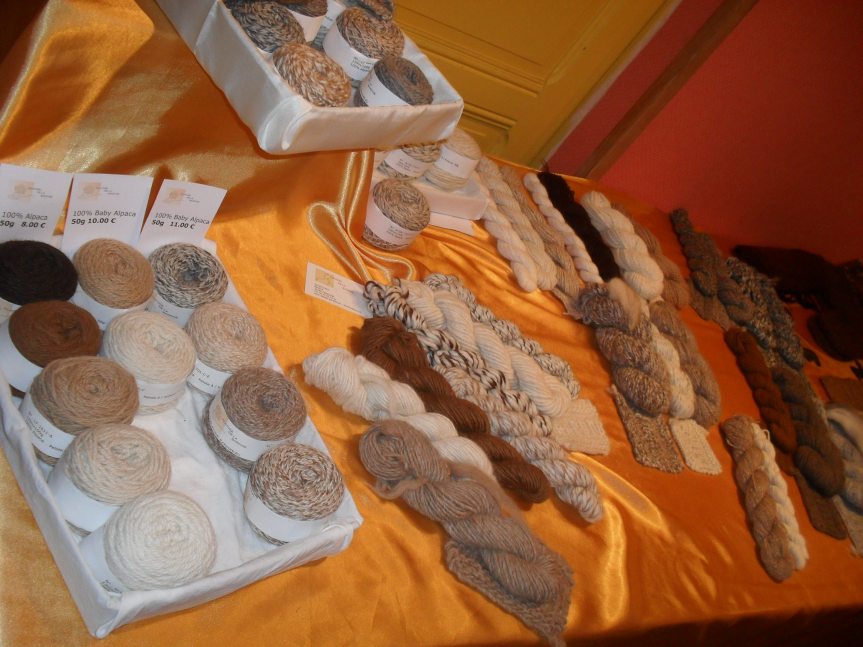Una de las fibras naturales que me interesan es la lana de oveja, por eso habíamos lavado tres sacos de lana sucia con el método de fermentación. La mayoría de la lana era de la oveja Navarra, que los pastores llaman ‘Churra’ aunque no pertenece al tronco Churro, sino forma parte del grupo de Razas Entrefinas del Pirineo. Otros vellones eran de la raza Latxa. ¿Qué vamos a hacer con la lana? Todavía no lo tenemos muy claro, por lo tanto quería saber, cómo será la lana Navarra-Churra hilada ‘industrialmente’. Nos hemos enterado de una mini-mill en Francia, que es capaz de procesar cantidades muy pequeñas de lana: a partir de un kilo. Es la ‘Filature de la Bardine‘ en Taillecavat. Como también pueden hacer hilo de alpaca, les llevamos diferentes pruebas de lanas el pasado domingo.
One of the natural fibres that I am interested in is plain sheep’s wool, that’s why we have washed three sacks of wool with the Suint Method. Most of this wool was from the Navarra sheep breed which the local shepherds call ‘Churra’ although they don’t belong to the Churro branch of sheep but to the Entrefina branch of the Pyrenees. The rest were fleeces from Latxa cheep. What are we going to do with all this wool? Actually, we don’t know yet, so I wanted to know, what the ‘Navarra-Churra’ wool would be like after an industrial processing. We got to know about a mini-mill in France that is able to process wool and other animal fibres in very small quantities: only 1 kilo is necessary. It’s called ‘Filature de la Bardine‘ en Taillecavat. As they also make yarn from alpaca, we brought them different samples of fibres last Sunday.
La dueña de la fábrica, Sandra Zahn, es suiza y por lo tanto podía hablar con ella en alemán 😉 Fue muy acogedora y nos enseñó toda la maquinaria y nos explicó el proceso entero. Ella no solo puede producir hilos de diferentes grosores sino también nappas o cintas de cardado, es decir lana cardada sin la hilatura. De las diferentes lanas que llevamos, pedí diferentes productos, según las cualidades: por ejemplo tenía una calidad inferior de lana Ouessant de color marrón que me va a procesar cintas de cardado. La idea es que la voy a hilar a mano haciendo un hilo muy gordo. La otra prueba de la lana Navarra será un hilo muy fino, para agujas de 2-2,5mm. ¡A ver! La única desventaja es, que Sandra Zahn tiene tanto trabajo que nuestra lana tardará en ser procesada casi 5 meses… Necesitamos mucha paciencia…..
The mini-mills owner, Sandra Zahn, is from Switzerland, so I was able to talk to her in German 😉 She gave us a very warm welcome and showed us all the machines and explained us the whole process. She can not only produce yarns in different thicknesses but also batts and roving. From the different samples that we brought to France, I ordered different products, depending on the qualities of the wools: for example from the brown Ouessant wool that has an inferior quality she is going to make a roving. My idea is to spin that roving on the spinning wheel and make a very thick yarn out of it. Another sample from the Navarra-Churra is such a nice quality that she tries to spin it very fine into a yarn suitable for needle sizes 2-2,5mm. Let’ see! The only disadvantage is that Sandra Zahn has so much wool to process that our wool will have to wait about 5 months to be processed…. We need a lot of patience….







